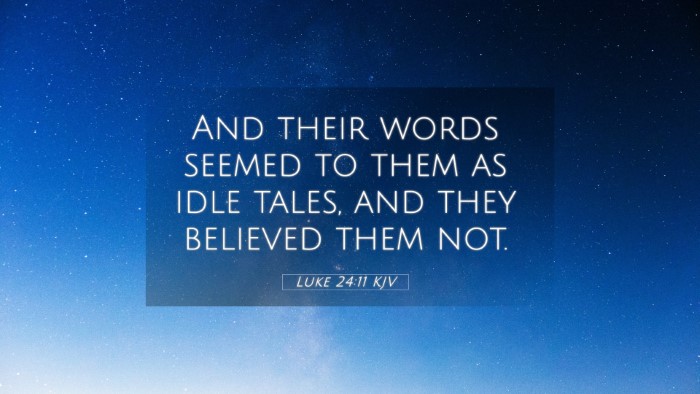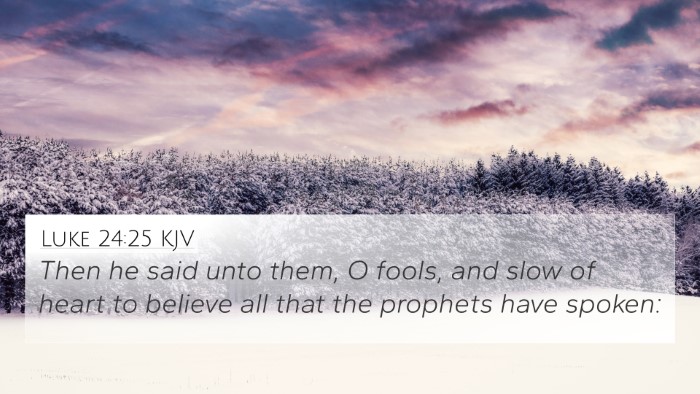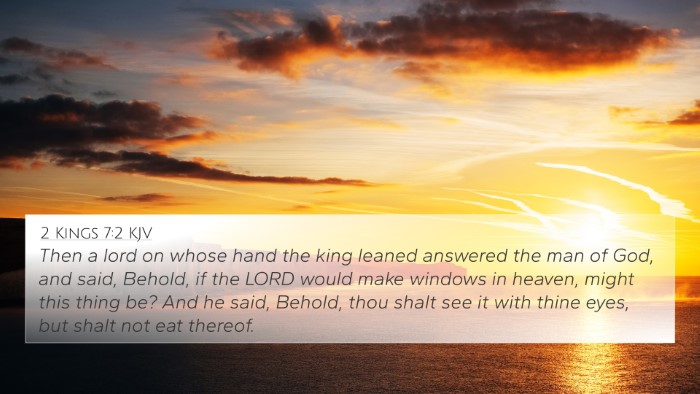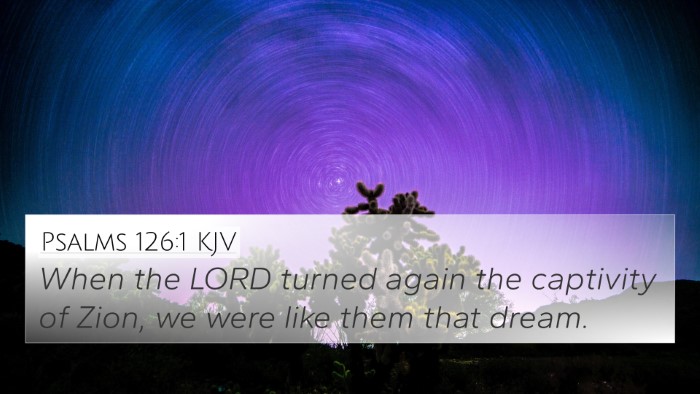Understanding Luke 24:11
Luke 24:11 states: "And their words seemed to them as idle tales, and they believed them not." This verse captures a significant moment in the resurrection narrative, highlighting the initial disbelief of the disciples when confronted with the miraculous news of Jesus' resurrection.
Summary of Meaning
The response of the disciples to the women's report of the empty tomb emphasizes human skepticism in the face of extraordinary claims. Despite being witnesses to Jesus’ teachings and miracles, they struggle to comprehend the resurrection, reflecting a common theme in Biblical narratives — that faith often grapples with doubt.
Insights from Public Domain Commentaries
-
Matthew Henry's Commentary
Henry notes that the women's report, despite being based on profound truths, was dismissed as "idle tales" by the disciples. He highlights the lack of spiritual understanding among the followers of Jesus, which serves to illustrate the human tendency to question divine revelations.
-
Albert Barnes' Notes
Barnes emphasizes that the phrase "idle tales" indicates disbelief and reflects a broader theme within scripture where people often reject divine truth due to preconceived notions and earthly reasoning. He encourages readers to recognize the transformation that faith brings, which can overcome initial skepticism.
-
Adam Clarke's Commentary
Clarke points out that this verse is pivotal as it shows the difficulties the apostles faced in accepting the resurrection. He connects their doubts to a lack of spiritual insight and understanding, and discusses how this disbelief is common among many, highlighting a human struggle with faith and understanding divine mysteries.
Bible Verse Cross-References
Luke 24:11 ties into various other scripture passages that explore themes of faith, doubt, and divine revelation. Here are some pertinent cross-references:
- Matthew 28:17 - Some doubted even as they saw the risen Christ.
- Mark 16:11 - The disciples did not believe the women who claimed to have seen Jesus alive.
- John 20:25 - Thomas’ disbelief upon hearing the news of the resurrection mirrors this skepticism.
- Luke 24:25-27 - Jesus’ rebuke of the disciples for their lack of belief in the prophets connects their doubt to a wider biblical narrative.
- Acts 1:3 - Jesus presented himself alive by many infallible proofs, addressing the disbelief encountered in Luke 24:11.
- 1 Corinthians 15:12-14 - Paul discusses the implications of denying the resurrection, linking back to foundational beliefs centered on Christ’s victory over death.
- Hebrews 11:1 - Explains the nature of faith as a belief in things hoped for, which contrasts sharply with the disbelief shown by the disciples.
Thematic Connections and Implications
Luke 24:11 invites readers to explore broader themes within the scriptures, emphasizing the connections between beliefs and the struggle against doubt:
- Faith vs. Doubt: Reflects a recurring theme where the faithful often grapple with uncertainty, as demonstrated by both Old and New Testament figures.
- Revelation of Truth: Encourages contemplation on how revelations are received and understood, drawing parallels to other scriptural accounts.
- The Role of Women: The women as primary witnesses highlight a significant cultural and theological statement regarding the value of their testimony in the early church.
- Transformation Through Faith: The eventual belief of the disciples after seeing the risen Christ signifies a shift from doubt to conviction, a powerful narrative arc throughout the Gospels.
- Historical Context: Understanding the skepticism of the disciples within the context of Jewish expectations concerning the Messiah and resurrection opens up avenues for deeper understanding of the text.
Comparative Bible Verse Analysis
This verse serves as a powerful reminder that doubt is a common human experience in responding to God's word. It also spurs interest in how other verses throughout scripture deal with similar themes:
- Psalm 146:6 - “He is the Maker of heaven and earth, the sea, and everything in them—he remains faithful forever.” Faithfulness of God contrasts the fleeting nature of human skepticism.
- Isaiah 53:1 - “Who has believed our message?” echoes the disbelief faced by prophets, linking Old Testament prophecies to New Testament fulfillment.
- Luke 12:28 - Encouragement to trust God amidst doubts shows continuity across scripture in addressing human fears and uncertainties.
Conclusion
Luke 24:11 serves as a critical juncture in the post-resurrection narrative, compelling readers to explore the interactions of faith, doubt, and revelation within both the Gospels and the larger Biblical narrative. The cross-references provided deepen our understanding of the themes of resurrection and belief present throughout scripture.









